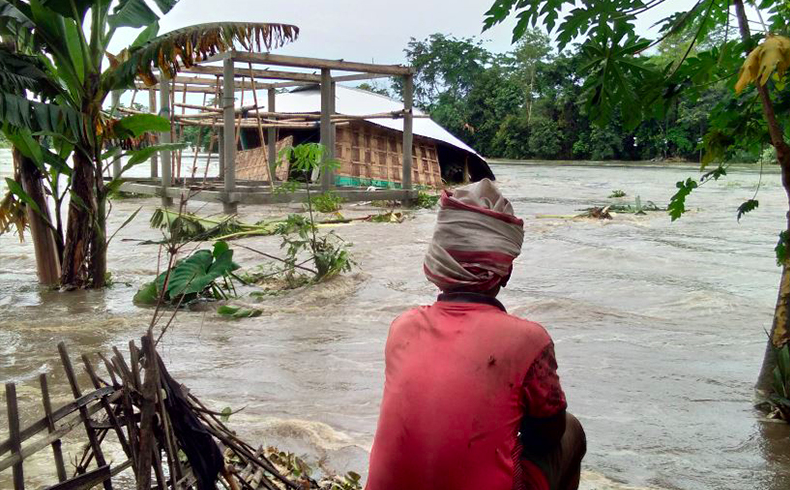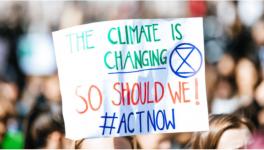Can Regular Discussion of Climate Change Disasters Impact Human Behaviour and Reduce Emissions?

Floods in Assam, an instance of extreme weather events fuelled by climate change. Image courtesy: UB Photos/Times of India
Does more climate change information result in action that can effectively combat the problem? A study published in Nature concluded that regularly attributing extreme weather events and other natural disasters to their cause, climate change, can result in more responsible human behaviour. This change in attitude can then lead to humans adopting behavioural changes that can reduce greenhouse gas emissions, and thus limit rise in temperatures. Another research, however, showed that in face of threatening climate change information, people try to relieve their anxiety by adopting more isolationist attitudes.
The Nature research, led by Brian Beckage from University of Vermont, USA, saw that interaction between two human behavioural traits defined the response to climate change action: a person’s perception of their ability to behave in a certain manner, and a person’s perception of societal response to their behaviour. That is, how much one believes they can change their own behaviour, and how positively or negatively they believe the society would view their behaviour as.
The team ran almost 8,00,000 simulations with different levels of the two behavioural traits and checked the impact on climate change. They saw that the best case scenario presented itself when both perceived personal ability and perceived societal response was high. The predicted increase in global temperatures were lowest in this case, at a rise of 3.4 degrees celsius by the year 2100. The opposite happened when perceived personal ability was high, but perceived societal response was low. Highest temperature increase of 6.2 degrees celsius by 2100 was seen in this case. When human behaviour is not considered in the model, a temperature rise of 4.9 degrees was predicted.
In the lowest temperature increase, the two behavioural traits interact to promote “cumulative mitigation responses”. These are long-term changes caused by reforms in public policy and regulations in economy. With just high perceived personal ability, more non-cumulative mitigation responses are seen. In these, individuals may adopt short-term changes, such as using air conditioners less, or taking public transport more often. But these changes in behaviour can reverse quickly and do not have a meaningful impact on reducing climate change.
The other research, published in Sage, showed that when presented with threatening consequences of climate change, individuals tend to suppress the anxiety induced by the threat and respond in a more symbolic manner instead of taking pro-environment actions. There is an increased display of ethnocentric and nationalist behaviours. This does not reduce the impact climate change can have, but does help in overcoming anxiety.
The study says, “People often respond to threat with suppression or avoidance. For example, smokers avoid information that reveals a connection between smoking and cancer. In addition, people who feel unknowledgeable about a threatening social issue avoid acquiring further information about it, creating a vicious cycle in which ignorance caused by threat breeds further ignorance.”
The researchers of the Nature study believe that management of public perception of climate change should be included in mitigation strategies and policies. Community programmes which promote changing habits to reduce emissions can play an important role in combating climate change. “For example, community solar organizations reduce the cost and difficulty of purchasing residential solar photovoltaics by offering education and financing options, and increase the local social acceptability of adopting solar by hosting community meetings and encouraging adopters to communicate with neighbours,” the authors write.
The paper, however, leaves some important questions unanswered, such as the difference of attitude of people in first and third world countries, and the extent of disasters that will prompt a large-scale behavioural change. The authors write that news organisations will have an important role to play, as only when they attribute extreme weather events to climate change can a change in attitude be seen. But most mainstream media organisations today are owned and run by corporate houses which have fossil fuels at the heart of their profits. How soon can their attitude be expected to change? Will it be too late by the time these corporates perceive climate change threats to be major enough to abandon fossil fuels?
Get the latest reports & analysis with people's perspective on Protests, movements & deep analytical videos, discussions of the current affairs in your Telegram app. Subscribe to NewsClick's Telegram channel & get Real-Time updates on stories, as they get published on our website.
























